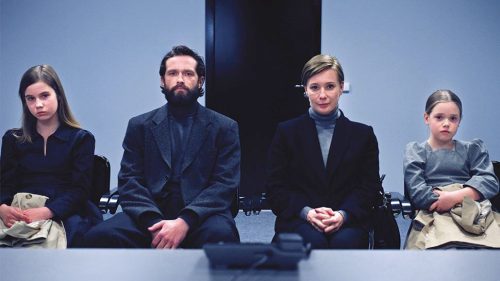
Sergei and Natalia, along with their daughters Katja and Alina, flee their homeland, desperately seeking a safe refuge where they can build a new future. When their asylum request in Sweden is denied, their dream shatters, and little Katja falls victim to resignation syndrome, a pathological condition affecting migrant children and adolescents, causing them to enter an unconscious sleep that can last for months or even years.
This state of total isolation from the outside world is an extreme form of defense against unbearable psychological pain. But Katja cannot sleep forever…
Quiet Life marks the return of Alexandros Avranas to Venice after winning the Silver Lion in 2013 with Miss Violence, which also earned Themis Panou the Coppa Volpi for his role as the monstrous father protagonist. As one of the most interesting voices in Greek cinema, following Dark Crimes (2016) and Love Me Not (2017), Avranas returns to explore the adolescent world and the depths of human suffering.
What is the Resignation Syndrome and where did you draw inspiration for this story?
In 2017, I read an article in “The New Yorker” on Resignation Syndrome, this mysterious illness that appeared, first and foremost in Sweden, and later in several different parts of the world. It was almost like the fairy tale of Sleeping Beauty but without the happy end, at least not in most cases. That was the beginning of Quiet Life; a dystopian film set in the present reality. Very often, I have the feeling that the society we are living is becoming more and more absurd, less and less human. The film explores exactly that; the lack of empathy from the system we created to serve us, but that we now have to serve. How we hide behind politically correct forms of behaviour, to avoid actually engaging with each other as human beings. Above all, what is the society we are leaving to our children? The film works as a metaphor, where the children are refusing, consciously or not, to continue living in this harsh world that we have created for them. They simply shut off their body, unconsciously, telling us with their silence that we have forgotten love, tenderness and humanity. That we have become lost in isolation, despair and pain. And you know, pain and poverty has no nationality. It is cruel and ruthless, for everyone.

Much like in Miss Violence, the family is the stage for the story. Although the context is different here, it is again a child who signals alarm and deep discomfort. Why this choice?
For me, children are the symbol of purity. Unformed souls that we as adults have the responsibility to protect. It is our job, as adults, to guide them in this world and to teach them how our society works – in a very protective way, or in a very distorted way like in Miss Violence. But children are becoming mirrors of ourselves, confronting us with our decisions and reflecting our weaknesses. In both films, Miss Violence and Quiet Life children are responsible for the beginning of the end. Their actions are the catalyst for the story, whereby the adults must take action or be held responsible for their acts, and their decisions. Decisions that are inextricably linked to the society we live in, with rights and needs as fundamental as safety, freedom and the right to exist; to have a hοme, like in Quiet Life, where the family are seeking asylum in Sweden. For them, asylum means more than citizenship in a new place, it is a question of life and death, of fundamental human rights.
While in Miss Violence, it is the system of the family that denies these rights to the people within it, in Quiet Life, it is the broader political system that is denying these rights, to an entire family. This is the key to the main difference between the two films: Miss Violence speaks about the lack of love and the absolutism of a closed system, while Quiet Life celebrates love, humanity and freedom.

Sergei and Natalia, along with their daughters Katja and Alina, flee their homeland, desperately seeking a safe refuge where they can build a new future. When their asylum request in Sweden is denied, their dream shatters, and little Katja falls victim to resignation syndrome,...
Your career has been marked by a very distinctive visual style and a narrative that often unsettles the viewer. How is this characteristic reflected in Quiet Life?
The elements that a viewer might find “unsettling” derive from the reality of Resignation Syndrome itself. How can you be unaffected, when you watch children to fall in a coma for up to 5 years, because they are not allowed to have a normal childhood? It is not my directing but the bare truth that makes the audience feel unsettled. The feeling of being part of a world where nothing is sure, or safe. And most of all, like the parents in the film, to be in this helpless situation where you don’t know how to help the person you love, your own child. Feeling “unsettled” means for me that we are still alive and willing to change, even if that means that we have to give up our quiet life.
How does your background as a sculptor influence the aesthetics of your films?
I suppose it makes me confident in all these things like composition, rhythm, framing, light and colour but I would say that my studies in a school of fine arts have taught me one very important thing; If you don’t have something to say then say nothing at all.